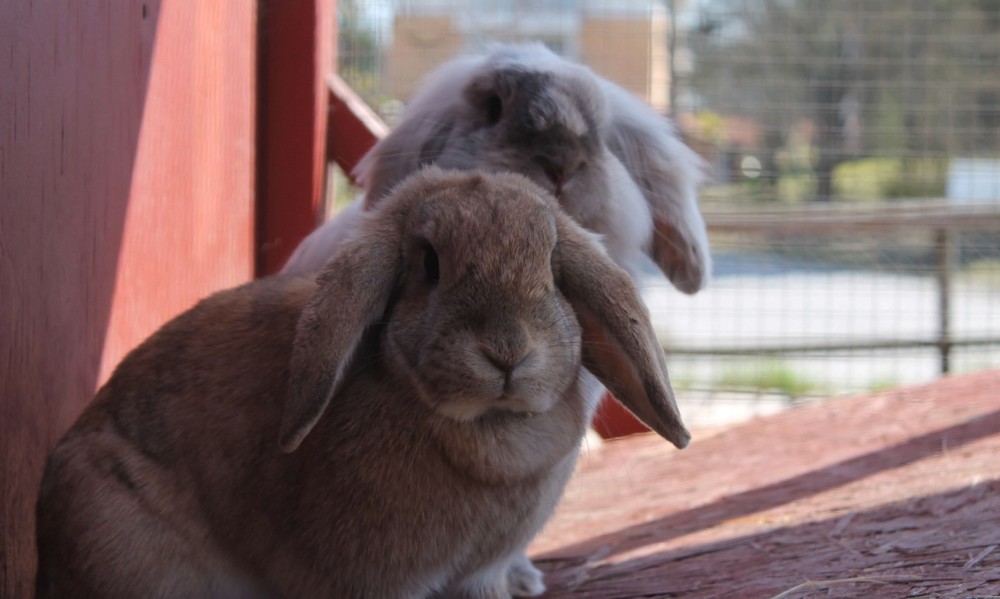It was the most traumatic event in my 8-year-old daughter’s life. A raccoon ate her pet rabbit while we were out of town. Our neighbor, and rabbit babysitter, called to tell us the news so she’d have time to adjust before we got home.
Outdoor rabbits are the most susceptible to predator attacks. Rabbits are often easy prey, and this is especially true for domesticated rabbits. Wild rabbits usually have an extensive burrowing network that protects them from predators and are able to escape easily.
But, confined rabbits usually have few options for escaping and little common sense when faced with danger. They tend to freeze when faced with danger and usually have no place to run because they are confined.
Although rabbits have teeth and claws, they don’t use them for defense. Their teeth are used for foraging on plants and their claws for digging in the dirt.
Rabbits have many predators including raccoons, weasels, dogs, cats, foxes, snakes, rats, hawks and other predators. While each of these predators attacks in different ways, there are some basic, important steps you can take to protect your rabbits and keep them safe.
How can you best protect your rabbits from predator attacks? For safety from predators, rabbits should be kept in a secure hatch that is raised above the ground at least 2 feet. Hutches should have hardware cloth surrounding the hutch as both rabbits and other predators can chew through wood and plastic cages.
Hatch doors should be latched with bolt latches to prevent raccoons from opening the doors. A secure roof will protect rabbits from both excessive heat and from aerial attacks from birds of prey.
Every location has its own set of predator problems. Even if you live in the city, there are predators that will seek to eat your rabbit for dinner. This article will dive into the basic safety precautions you should take to protect outdoor rabbits and the steps you should take for specific predators.
1. Secure Rabbit Hutches
Commercial rabbit hutches are often convenient, but seldom very secure. Hutches come in three main materials: wood, plastic and wire.
But,
What is the best material for rabbit hutches? Each material has benefits for rabbits.
Wooden and plastic hutches provide shade and won’t get hot to the touch in the summer. This helps to protect rabbits from burns and keep them cooler in the summer. But, wood and plastic can be chewed through by a rabbit or a predator so they aren’t completely safe.
On the other hand, metal hutches are safer from predators but tend to get hotter and colder in extreme temperatures.
Most people who raise rabbits take the time to create a safe setup for rabbits that accounts for both the weather factors and one that protects rabbits from predators.
It’s very popular to have an outer wooden hutch that a metal cage fits inside of. The metal prevents rabbits from chewing through the wood and provides solid protection from predators. But, the wood provides shade and keeps the metal cool.
Another option if you are raising many rabbits is to use metal cages that are housed under a roof or in a shed. The roof will provide shelter from the elements and from birds of prey.
It doesn’t have to be a fully built garage or shed, but can be a permanent pavilion or carport.
2. Raise Hutches Above Ground Level
Many rabbit breeders like to keep their rabbits in cages in a controlled environment. Others prefer to keep rabbits in a colony that mimics natural environments. I’ll discuss safety for a colony in the next section.
Raise your rabbit cages above ground level. Cages and hutches should be raised at least 2-3 feet above the ground.

This serves many purposes.
- It protects the rabbits from ground predators
- It protects rabbits from cold and wet conditions that tend to be worse at ground level
- It makes your rabbits easier to care for when they are raised- you don’t have to bend down
3. Secure Ground Colonies With Buried Hardware Cloth
Rabbits love to dig, but so do other animals. Raccoons, foxes, dogs, cats, and weasels will dig under a fence or a rabbit house to gain access to rabbits.
If you are raising rabbits in a colony-style, you will need to line the perimeter of the colony with buried hardware cloth. Bury hardware cloth at least 1 ½ -2 feet below the ground to prevent underground burrows.
This will keep predators from digging under the fence to eat your rabbits. It will also help to contain your colony of rabbits.
4. Secure Hutches From Tipping Over
It’s important to make sure your hutches are secured and won’t tip over. Wind and predators can cause a rabbit hutch to fall or tip over and pose danger and harm to rabbits.
If your hutch is on legs, secure the legs in cement, cinder blocks or with stakes so they have added support.
You can also raise rabbit cages up on cinder blocks. Because they are wider, they won’t tip over as easily as wooden legs, but make sure your cage is secure from being pushed off the blocks. Predators will try to tip over a cage to gain access to rabbits.
Plus, cages can break when tipped, which makes your rabbits very vulnerable!
5. Secure All Openings of Cages or Hutches
Openings that are as small as ¾ of an inch can pose a danger to rabbits. Snakes, weasels, and rats can all fit through very small openings. Secure gaps in your cages or hutches.
Any gap over ½ inch poses a threat to your rabbits.
Of course, if your cages are raised on metal legs, making it harder for predators to climb, and secured under a roof, it will already be very hard for predators to enter the cage.
But, if your rabbit cages are on cinder blocks or have wooden legs, then many predators can still climb up to the cage and get in through small cracks.
6. Use Hardware Cloth, not Chicken Wire
It may be tempting to use chicken wire to secure and cover the gaps in your cages and hutches. But, chicken wire is only good to keep small animals such as chickens or rabbits contained. It offers zero protection against predators.
Raccoons, foxes, and dogs can easily tear through chicken wire to get to your rabbits.
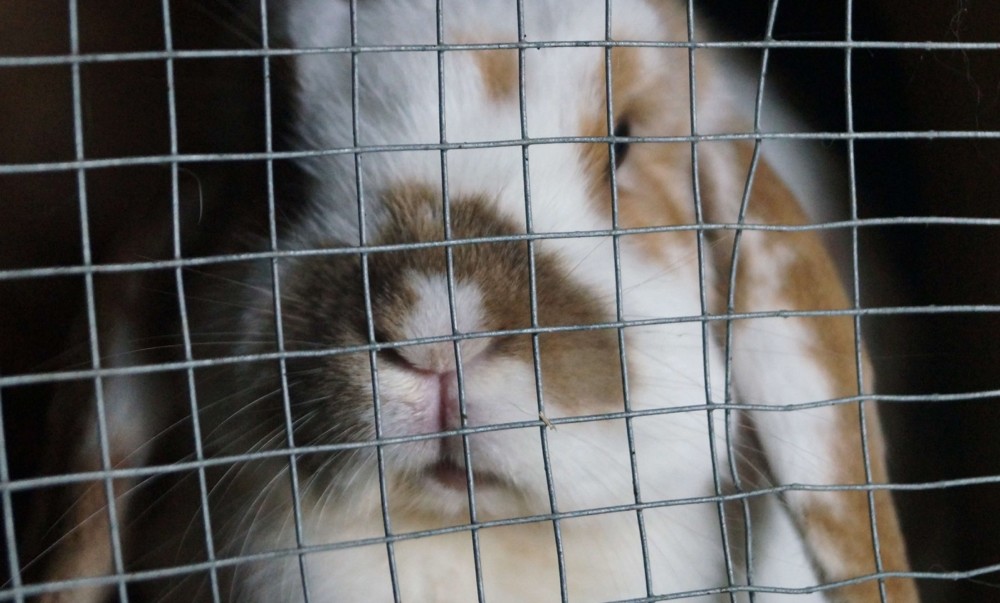
Instead, use hardware cloth. It is more expensive, but it won’t tear or rip from sharp claws. It will hold up over the years and not stretch when pulled or pushed.
¼ inch hardware cloth is best, but ½ inch hardware cloth will often offer enough protection. Raccoons are best kept out with ½ inch hardware cloth.
7. Be Mindful of Surrounding Area
It’s also important to be aware of the area around your rabbits’ homes. Look to see if there are trees, buildings and other features that could allow a predator to climb and jump in order to gain access to your rabbits.
Eliminate or move other attractions to predators. Trash, compost, or even your own pet’s doghouse can pose a risk to predators by bringing them nearer to your rabbits.
Move compost and trash away as the smell will bring in hungry animals.
If your dog house is close, consider moving it away. Most dogs will still kill and eat a pet rabbit unless they have been trained not to from a young age.
8. Secure The Door
You may be surprised to realize that some predators can open hutch doors or cage doors. Simple locks and hooks are easy for animals to push open. Raccoons are able to open anything that a 2 or 3-year-old child can open.
Bolts are more difficult for them to open. There are also spring latches that require coordination and timing to open, which will be more secure as they require more hand-eye coordination to operate.
- Fenced in
- Electric
9. Perimeter Fencing
Another way to protect your rabbits from predators is to add a perimeter fence around the rabbit area. Fences will help to keep out dogs, cats, foxes, coyotes, and even the occasional person who may be tempted to steal a rabbit.
- Fences should be 6.5 feet high to secure against larger dogs, coyotes, and cats
- Secure gats with a bike lock or combination lock
- Bury hardware cloth around the outside of the fence or 1.5 feet deep to prevent animals from digging under the fence.
10. Electric Wiring
If your predator problem is extreme, as it often is in the countryside, you may need to add electrical wire to keep predators away.
Electrical wire is easy to install and is very effective in deterring predators. Check out how strong and frequently to use electrical wire, depending on the types of predators you have.
- Electrical fences use different volts to deter different animals
Now, let’s dive into specific predators and what you can do to protect your rabbits.
Protect Rabbits From Raccoons
No matter where you live, in the city or the country, you probably have raccoons that would love to eat your rabbits. Yes, raccoons eat rabbits and although wild rabbits get pretty good at avoiding them, caged rabbits have no place to hide.
Raccoons are a hard predator because they are smarter than many predators and they have a thumb, which provides them additional ways to get into cages and sheds. They are smart and they are ruthless.
Raccoons generally start to hunt at dusk and they are excellent smellers.
Even when a raccoon is too small to enter through an opening, they will reach in and grab an animal and pull it through.
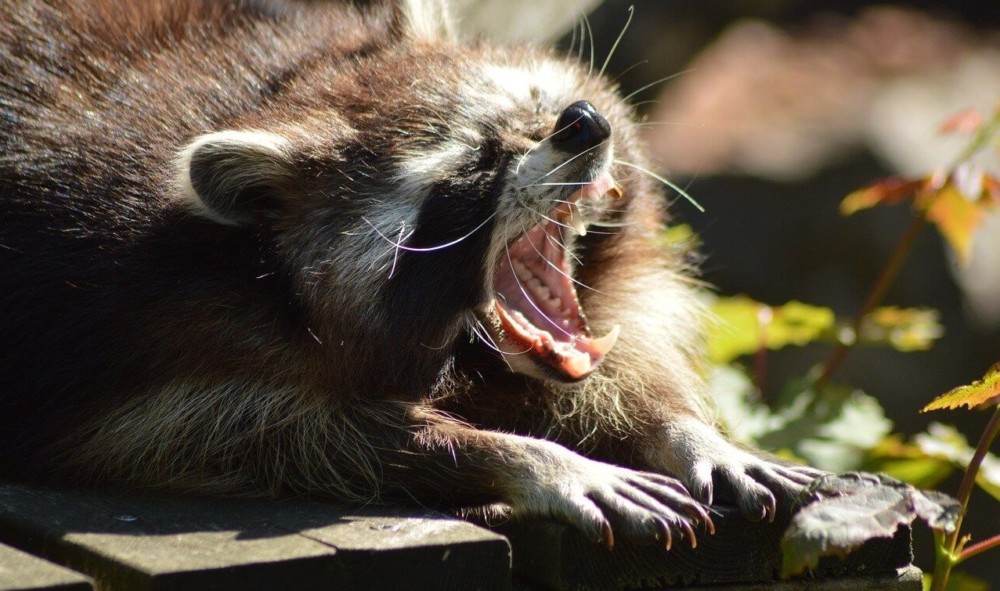
This causes a bloody and horrible mess. It’s also traumatizing to children (and adults). It’s a horrible way for any animal to die.
Plus, raccoons can open a lot of latches and simple locks. Anything a small child can open can usually be opened by a determined raccoon. Add a lock to your rabbit latch or use spring-loaded latches or barrel latches to keep raccoons from opening the door.
You should also cover wooden hutches with hardware cloth. This will enclose gaps and holes and keep raccoons from breaking through the wood. Chicken wire does not protect rabbits.
- Use locks and spring-loaded latches to keep raccoons from opening cage doors
- Add hardware cloth to the outside, or inside of your rabbit hutch to prevent raccoons from tearing through other materials to get to your rabbits.
- Close all openings and gaps in your hutch
Protect Rabbits From Hawks and Owls
Birds of prey are predators that rabbit owners may not think about, but they pose a real risk to rabbits. Hawks and owls are especially strong for their size and can carry off a fully-grown rabbit.
Owls hunt at night and providing your rabbits a solid place to sleep helps to keep them safe. Even if you have a wire cage, line two sides with wood or a tarp so your rabbit can sleep in a protected place where owls won’t see them.
Hawks and eagles usually hunt in the morning. If you have a big threat of hawks, then use the mornings to check on your rabbits and make your presence known. Check at different times of the morning as hawks can learn what times you go out and time their attack accordingly.

Even if a hawk can’t pull your rabbit through the cage, it can kill it in the attempt. There are several things you can do to scare away hawks, owls, and eagles.
- Keep rabbits under a roof. Either add a solid roof over your rabbit’s cage or have a larger roof over their entire area.
- Use fishing wire, and reflective tape to scare away flying predators. Space fishing wire or reflective tape apart every 2-3 feet above your rabbit cages. The reflection can be seen by birds of prey, but they don’t have depth perception when it comes to light reflection. They can’t tell where to safely fly and will avoid the area.
- Hang CD’s from tree limbs and nearby overhangs. CD’s reflect the light and do the same thing as a reflective string or fishing wire, but in my experience isn’t as effective. But, if you have CD’s in various areas around your rabbits, you should still be ok.
- If rabbits are in metal cages, provide a smaller house or line 2 walls of the cage with wood to protect rabbits while they sleep.
- Check on rabbits in the morning times when hawks are most likely to be searching for food. Vary the time you check on them.
Protect Rabbits From Weasels and Stoats
Weasels and stoats are intimidating predators because once they taste or smell blood, their killing instinct turns on and they will kill everything they can catch, even if they never eat it.
That means that a weasel looking for a meal can cause a lot of destruction.
Weasels are everywhere, but because they are usually night hunters, most people don’t see them very often. They are also the world’s tiniest predators. Weasels can fit through extremely small openings.
They also camouflage very well. In the winter, many weasels will change their fur from brown to white.

There are several steps you can take to protect rabbits from weasels and stoats.
- Provide rabbits protection away from wire cages and fences. Weasels can fit through very small openings. If your rabbit has a house to retreat into, it hides them from the weasel.
- Use hardware cloth to line fences and hutches. Hardware cloth is strong and will not cut or tear from the sharp claws of stoats.
- Bury hardware cloth 2 feet deep if rabbits have access to a rabbit run. Weasels and stoats dig very well and will dig under a fence.
- Do not use bonemeal or other meat-based products to “scare” away predators. This will only attract weasels to the area.
Protect Rabbits From Dogs
Wild and domestic dogs are a real threat to pet rabbits. Even your own dog is likely a threat as most dogs will chase and kill a rabbit unless they have been trained not to hunt rabbits.
One of the best protections for rabbits is to have an outer fence that keeps dogs away from rabbit cages. A high fence that isn’t climbable is best. Even large dogs can be kept out with a 6-foot fence around the perimeter.
You will also want to bury the fence 1-2 feet deep as most dogs will dig under a fence within a few minutes.
In lieu of burning the fencing, you can attach hardware cloth to the bottom of the fence and lay it on the ground along the fence for 1-2 feet. This will also prevent digging from predators.
- A perimeter fence that’s 6 feet high will keep out most dogs
- Bury the fence 1 ft deep or line the outside of the fence with hardware cloth 1-2 feet out so dogs can’t dig under the fence
- Make sure that hutches are secure and can’t be knocked over by larger dogs.
Protect Rabbits From Cats
Cats love rabbits and can climb almost anything, including fences. To protect your rabbits from cats, install a cat roller on the top of the fence to keep them from getting over the fence. As the cat climbs to the top, the roller spins and the cat falls back again.
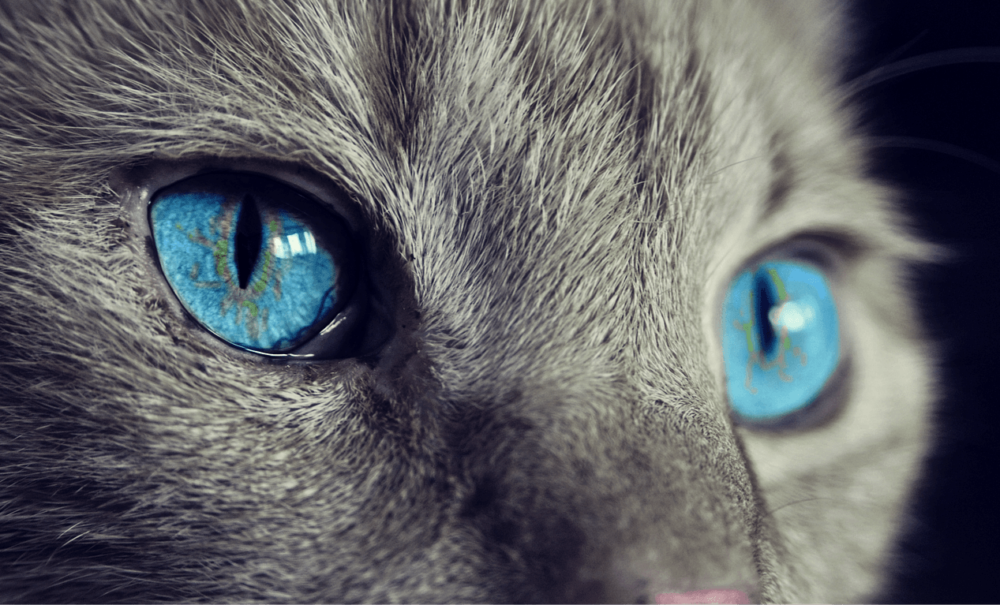
- Cat-proof fences by adding a roller at the top of your fences to keep cats from climbing over
- Predator proof hutches and cages as outlined above
- Install motion-activated sprinklers to scare cats away.
Protect Rabbits From Snakes
Snakes eat rabbits and once they discover them, they will keep coming back. Although you may be tempted to kill or trap the snakes in your area, most states prohibit harming and trapping snakes.
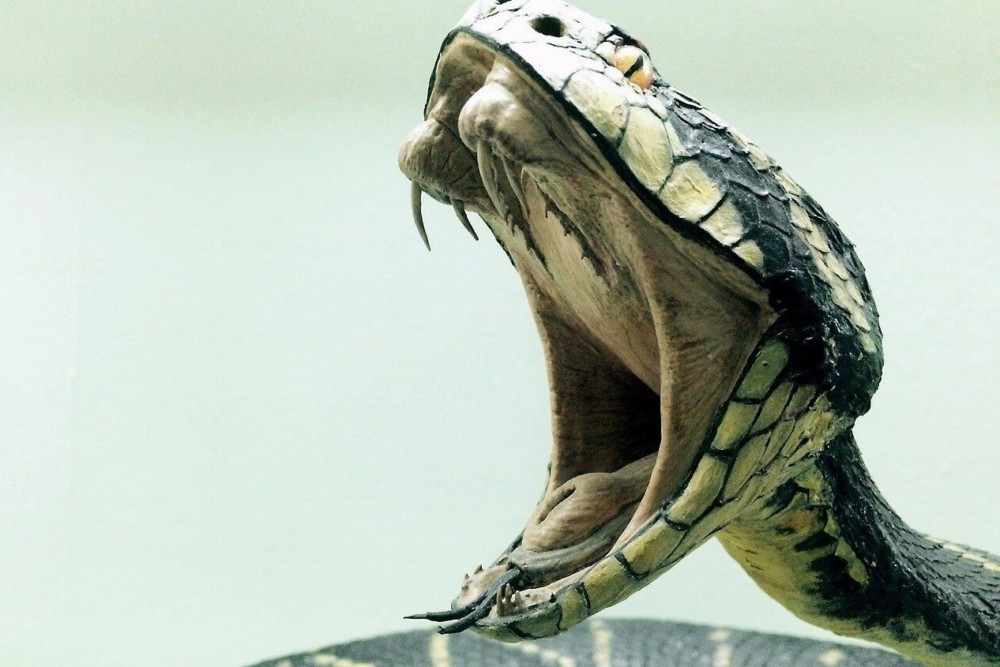
Fortunately, there are several things you can do to protect your rabbits.
- Use hardware cloth on the bottom 1 foot of all fencing around your rabbit hutches. It should be ¼ inch hardware cloth to keep snakes from getting caught in the cloth and dying
- Clean up leftover food to avoid attracting snakes to the area
- Clean the area around your rabbits. Keep grass mowed short, trim bushes and eliminate hiding spots for snakes
- Make sure all openings in your rabbit cages or hutches are closed with hardware cloth
There are many types of snakes that eat rabbits in North America. Even snakes that are harmless to people can be deadly to rabbits.
Did you know?
Snakes can eat an animal twice as big as its own size! Some snakes only eat cold-blooded animals such as lizards, fish, eggs, and insects. But other snakes will eat larger animals.
Snakes that eat rabbits include:
- Garter snake: All of North America
- Gopher snake: Eastern North America
- Kingsnakes: Southeastern Canada and south
- Rattlesnakes: Southwestern Canada and south
- Burmese Python: Invasive to Florida
- Southern Black Racer: Eastern United States
- Brown Snake: Australia
- Rat Snake: Southern, Eastern, and the Midwestern United States
Protect Rabbits from Foxes and Coyotes
Foxes and coyotes are other predators that exist almost anywhere in the United States. Both animals will dig under a fence to gain access to an easy meal. They usually hunt at night and have excellent night-vision.
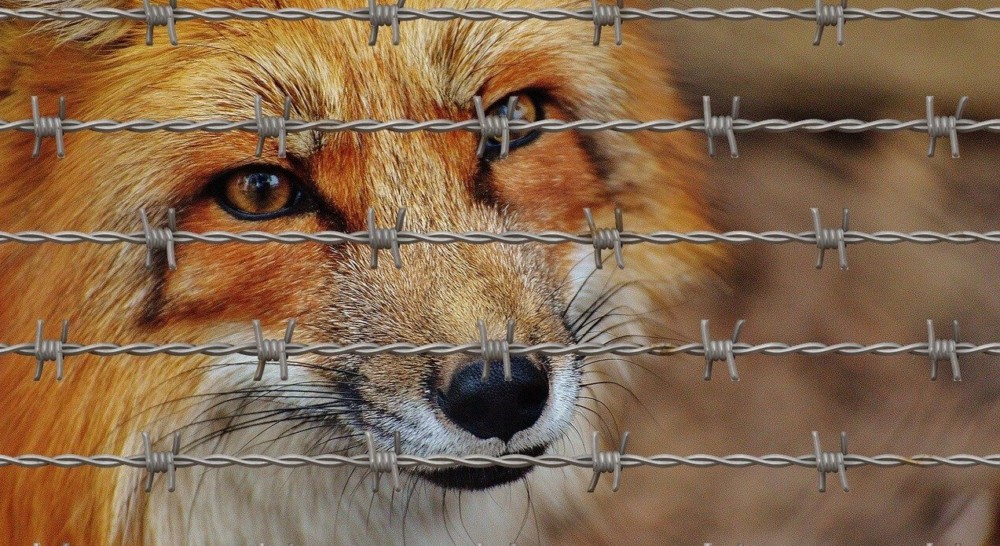
To protect your rabbits, take the following steps:
- Install motion-activated light detectors. This is more effective than leaving a light on all night as it will scare foxes and coyotes away when the light turns on.
- Make sure to have a perimeter fence installed. This creates another barrier between your rabbit houses and predators.
- Add noise-makers around your rabbit area. This can be tying a plastic bag to the hutch so it rustles in the wind, leaving a radio turned on, or having a couple of cans hanging that will bang with movement. Coyotes are smart, but they are also small and can scare easily. Foxes don’t always scare as easily.
- Make sure you have taken the other precautions to secure your rabbit cages outlined in the first section of this article.
Protect Rabbits From Rats
Although they may be easy to ignore, rats do pose a danger to rabbits. They are vicious and mean. Plus rats carry many diseases that are transferable to rabbits because they are distantly related biologically. Some of these diseases include Hantavirus, Tularemia, and Lymphocytic Choriomeningitis.
Rats will be attracted to smell, rabbit food, and can easily enter through very small spaces.
- Clean up spilled pellets from rabbit cages before nightfall
- Store food in airtight containers
- Place rat traps near the legs of your rabbit hutch
- Secure hutch and eliminate small openings. Rats can get through very small spaces
- Use hardware cloth to cover wood and weak areas of the rabbit hutch. Rats can chew through wood and plastic.
Recommended Resources To Protect Rabbits:
There are a number of specific tools I mentioned that are much more effective at protecting rabbits. I’ve listed those tools and added a link to them on Amazon in case you’d like to take a closer look at them. I hope this helps you keep your bunnies safe!
Recommended Rabbit Supplies
This list contains affiliate products. Affiliate products do not cost more but helps to support BestFarmAnimals and our goal to provide farm animal owners with accurate and helpful information.
Housing: If your rabbit is indoor, you’ll need a cage, a hideout (to keep your rabbit from death by heart attack), and a space for it to get exercise and spend time with you. If you don’t want to let it run free in your house, this animal playpen provides space and keeps your rabbit from hiding under your couch.
If you keep your rabbit outdoors, an outdoor hutch that provides space and protection from predators is needed. (I’d still keep mine in a barn for further protection from the elements.)
You’ll also need bedding, toys, a grooming brush, and treats for your little friend. A litter box is important because rabbits can be potty trained. Timothy hay is the best kind of hay for rabbits as alfalfa is too sweet. Don’t forget a water drinker. I like the half-gallon waterer because it can cover two rabbits for several days. Pair it with a food bowl or a food manger (a little cleaner) and you’ll be set up!
If you want to treat your bunny to entertainment, a cat tower, a treat ball, or bunny toys all work wonderfully.
Finally, if you plan on taking your rabbit with you on trips, you’ll need a carrier. Here’s a small carrier or larger carrier that work great for occasional travel. If you travel a lot, you might want the carrier that’s rated #1 in safety for safe travels
Lastly, I use this odor eliminator for accidents and to wipe out the bottom of the cage and litter box when I clean it.
Related Articles:
You might also find these articles helpful in caring for your rabbits.
Protect Your Rabbits From Sub-Freezing Winter Weather

